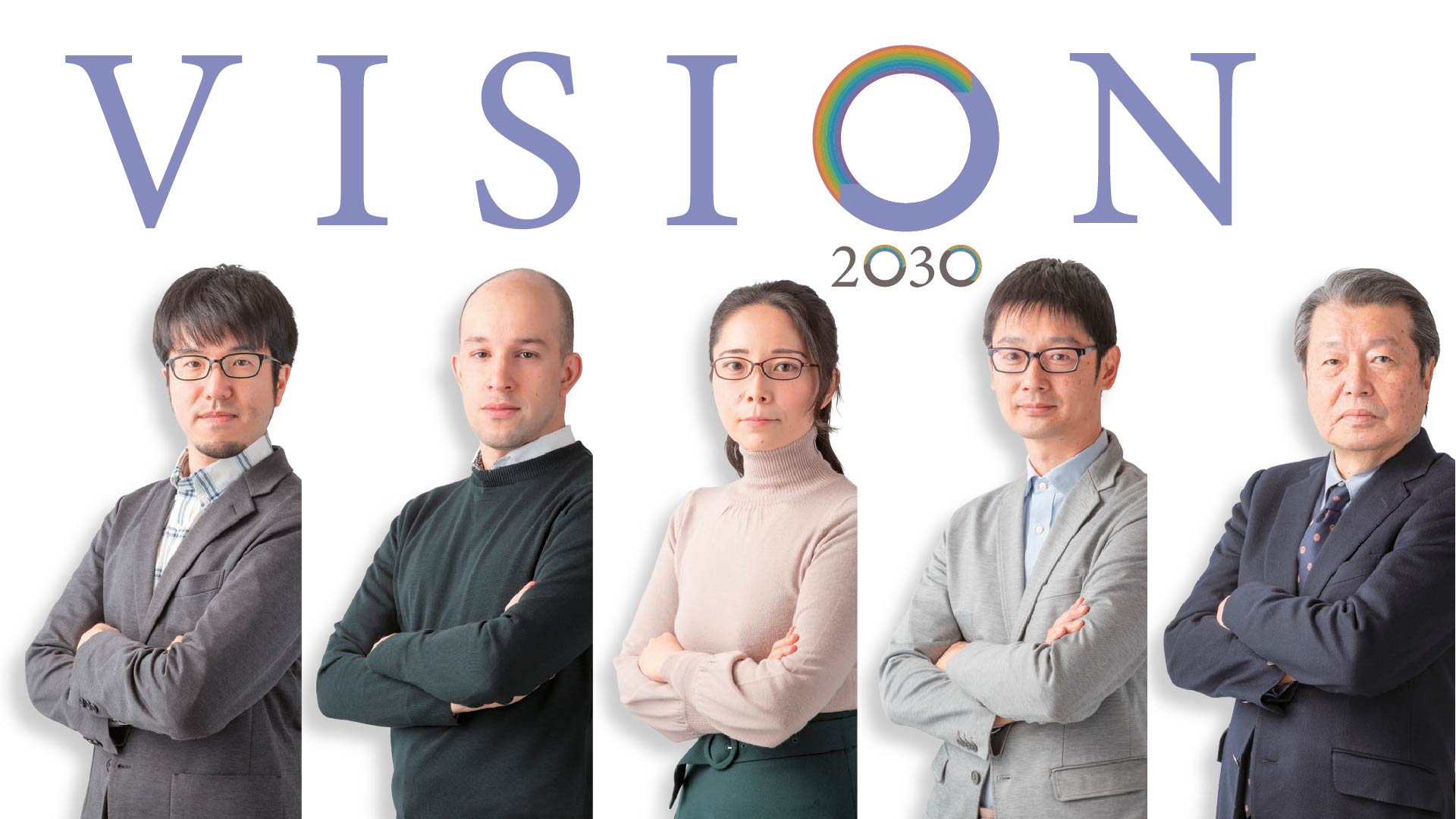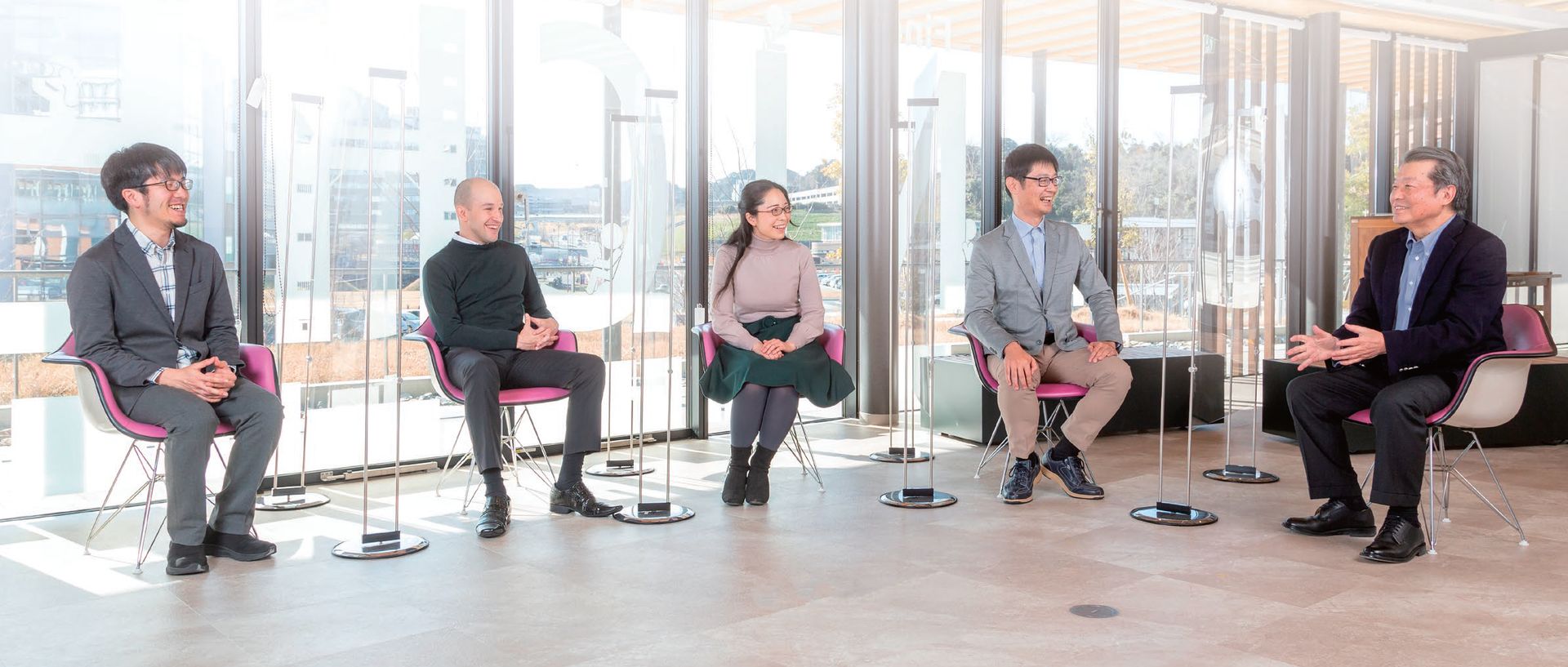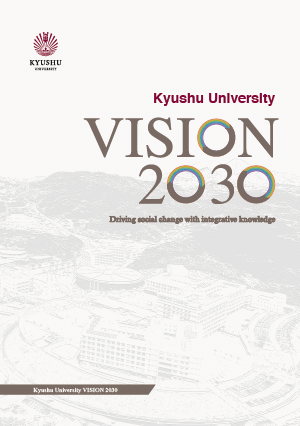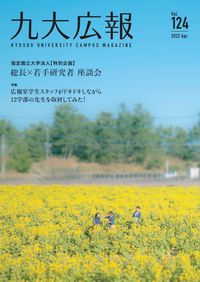
A shared vision for Kyushu University
President Ishibashi and early-career researchers candidly discuss the direction the university should take
Kyushu University envisions itself becoming a “university that drives social change with integrative knowledge” in the next decade, but what exactly must we do to make this vision a reality?
Ishibashi Ten years from now, early-career researchers, including everyone here today, will be at the center of this effort. It can be challenging to capture the future of the university as a whole, but today, please share your candid opinions on how each of us should change toward this vision.
To begin, can you tell me some of the positive features of Kyushu U that you encountered here?
Kato I would have to say that Kyushu U stands out for its state-of-the-art, shared-use research facilities and laboratories. Here, I have access to the latest equipment that isn't available to individual laboratories, which allows me to conduct almost any experiment I can conceive.
Fujii Kyushu U has many international students who are extremely talented. Their presence contributes to rich international intellectual exchange.
Nagatsu Since I’m usually at Ohashi Campus, I used to feel both physically and mentally distanced from the Ito Campus, the largest of all Kyushu U campuses and home of many faculties. This feeling has changed in recent years thanks to increased interdisciplinary efforts in research and education.
Ishibashi Due in part to the COVID-19 pandemic, we have improved our IT infrastructure and can now easily connect online. This has drastically advanced collaboration among campuses, saving time by not having to travel between them.
Fujii Kyushu U is a large university, and, by being big, there are problems such as the ones we find in large corporations. So, I believe a skilled leadership that is open to challenges is crucial. I appreciate the current leadership’s ability to make decisions quickly and the President’s efforts to communicate his views to both the faculty and administrative staff.
How to bring about social change
Ishibashi In what way can you say your research is connected to society and its betterment?
Fujii My research focuses on the Japanese economy and environmental economics. When considering how to apply my research to society, I've felt the impact of publishing papers and framing conclusions as policy recommendations can be limited. So last year, I took part in serializing my research as a newspaper column, which generated inquiries from different fields, including corporate entities.
I feel that if we could introduce our research to the general public in a way that is easy to understand through the media and other channels, opportunities for joint research would expand, and the tangible results of that research would then lead to policy proposals. When I first came to Kyushu U, I wanted to prepare people for the future. Now I am doing just that, focusing on postgraduate education, where I can produce more research findings through student guidance and train the next generation of leading researchers.
Kato I’m currently searching for a candidate drug with strong therapeutic potential against COVID-19 that can be brought to clinical trials. But specialized insight is needed to transform basic research into practical applications and patents, which Kyushu U provides through its Center for Clinical and Translational Research (CCTR). The center comprises experts from a wide range of fields, and I believe that this kind of interdisciplinary organization is key to the university’s success.

Ishibashi Kyushu U is driving open innovation by drawing on our wealth of knowledge and advanced technology and integrating it with technology and expertise from local government and industry. Obtaining a patent is not something a researcher can do alone, and the university is here to provide support whenever you need it.
Vargas I specialize in artificial general intelligence (AGI), but I also believe brain science can offer valuable insights, so I have begun to observe brain stem neurons, and I am also applying psychology to my research. I am also focused on joint research with industry in hopes of finding practical applications for my research findings.
Nagatsu I study arts management and cultural policy, so I am often engaged with society through the arts. I am currently working with theaters in Kyushu on a research project to find ways of making it easier for people with disabilities to express themselves in theater spaces. I am also conducting projects to create art and explore its meaning with residents in communities facing depopulation, aging, and other social issues. I feel that my research, which is concerned with redesigning social processes and events, is well-aligned with the university's vision.
Creating new value with digital transformation in research and education
Ishibashi Digital transformation (DX) is one of the priorities we set in our vision. What are your thoughts on the possibilities for DX?

Vargas Data can be used in so many different applications for a variety of purposes, and even more becomes possible when we start combining this collected data in different ways. I believe that exploring new ways to use and combine data from various perspectives has great potential for creating new value that will lead to social change.
Fujii I believe DX can play two major roles. Firstly, it can visualize things that have so far been invisible. For example, a recent study with cutting-edge sensing technology explored people’s sense of well-being to measure the progress and effectiveness of policies implemented to solve problems in society. Secondly, I believe DX can help us decipher the cause and effect relationship in the labyrinth of networks that exist in our society. It can help us prioritize the areas in which we should invest money and human resources, for example.
Nagatsu In one of my undergraduate courses, we are developing apps that are oriented toward solving social issues. I tell my students it is not enough to just display the data. What is important is a user-friendly way of providing data. This is a part of “humanizing technology,” which the Kyushu U School of Design has been promoting.
Being role models for students by embracing diverse values
Nagatsu I think that is it important to not forget diversity. Actively confronting issues related to gender, LGBTs, disabilities, and nationality will lead to an environment that is more conducive to creativity. There are also many areas where students are pushing forward how we think about diversity. I think that diversity is an essential aspect for making students truly feel secure.
Kato I agree. Currently, there are no female full professors in pharmaceutical sciences. Among the female faculty, many are in their thirties or forties like me and are particularly conscience of their work-life balance. Thus, I feel that we need to act as role models for female students so that in the future more of them will pursue a career in this field.
Ishibashi Diversity in the development of our early-career faculty members is absolutely essential for Kyushu U to continue to grow and progress. We are looking forward to the career progress of current and future early-career faculty members and students at Kyushu U, and we will continue to provide support for these endeavors. Let us move forward toward 2030 together.
This is an abridged translation of an article that first appeared in the April 2022 issue of Kyushu University Campus Magazine (九大広報), the university's Japanese-language magazine. View the full issue online (18.5 MB) or browse past issues for more information in Japanese about recent happenings at Kyushu U.
































